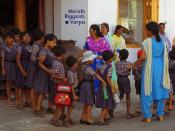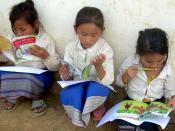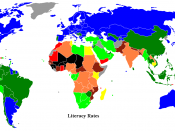Emergent Literacy
This essay will look at the development of emergent literacy from birth to school age. The concept of language and literacy refers more directly to speaking, listening, thinking, reading and writing, and viewing. I will identify the degree to which these skills develop in a young child, along with the social, cultural and historical influences and interactions they encompass. I will discuss the relationship between Te WhÃÂriki and my philosophy along with how I would implement oral, visual written and digital literacy within a centre environment. I will also illustrate the best way to create a literacy rich environment while maintaining a holistic approach.
The first six years of our lives are a time of unparalleled discovery as we learn about ourselves and the world around us. Our personalities take shape and we begin to lay the foundation of knowledge that will support us throughout the education system.
For the majority of children, learning to communicate through verbal communication is an important part of their development. A pre-speech baby will use gestures and expressions and babblings to interact with others. A toddler will participate in turn taking and non-verbal skills such as pointing to satisfy a need or want. The more pre-schoolers participate in the world, the more they discover that language is useful. In addition they realise the potential of language for expressing their thoughts and feelings. From bedtime stories to a parent playing a game such as "peek-a-boo". (Clark & Ireland, 1994).
By the time children reach three to five they have a very large vocabulary. Forming sentences containing up to eight words, telling stories, some children can even recall events. Constantly asking questions at their age seems to have become their favourite past time. Babies and toddlers can grasp language long before they can use...


